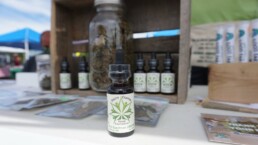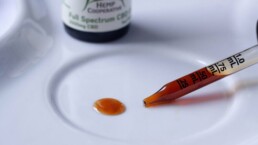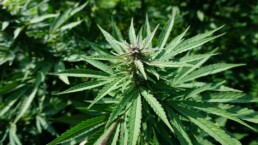Learn About CBD
“As my knowledge of things grew I felt more and more the delight of the world I was in.”
- Helen Keller
Learn About CBD
“As my knowledge of things grew I felt more and more the delight of the world I was in.”
- Helen Keller
What is CBD, and how does it work?
CBD (Cannabidiol) is an oil that is extracted primarily from the flower of the hemp plant. When used properly, authentic CBD has been observed to have a multitude of beneficial effects in the body through it’s interaction with our Endocannabinoid System (ECS). The ECS is a natural response system found in human and animal bodies that regulates sleep, mood, appetite, memory & learning, reproduction & fertility, and skin & nerve function.
First, let’s define a few key terms….
-
Cannabinoid – An organic compound found in the cannabis family of plants, including hemp, that mimics naturally produced “endocannabinoids” inside the body.
-
Endocannabinoid System (ECS) – A three part system found in human and animal bodies that plays a role in regulating a number of functions, such as sleep, mood, appetite, memory and learning, reproduction and fertility, and skin and nerve function.
-
Part One – Endocannabinoids: Organic molecules made by the body that are similar to cannabinoids found in the cannabis plant.
-
Part Two – Endocannabinoid Receptors: Found throughout the body, these receptors send signals when they bind with endocannabinoids and cannabinoids. These receptors have been heavily studied in Israel and other countries outside the US, and are known as “CB1” and “CB2” receptors.
-
Part Three – Enzymes: Responsible for breaking down endo-/cannabinoids once they’ve carried out their function
-
-
CBD – Short for “Cannabidiol” – a cannabinoid, and one of over 100 types of compounds found in the Hemp/Cannabis plant. CBD does not produce a psychoactive effect. CBD is also a powerful antioxidant. When ingested, the body produces endocannabinoids that interact with CB1 and CB2 receptors in the body.
-
THC – short for “Tetrahydrocannabinol” – one of over 100 types of compounds found in the hemp/cannabis plant. THC does produce a psychoactive effect at certain concentrations. All of South Central Hemp’s products contain less than 0.3% THC per state and federal regulations.
-
Full Spectrum: A product containing the complete array of cannabinoids, including CBD and trace amounts of THC (less than 0.3% in the State of WI). Full spectrum products typically contain other beneficial vitamins and amino acids also found in the hemp/cannabis plant. The advantage of a Full-Spectrum product is known as the “Entourage Effect”, as cannabinoids have been shown to work better together, than in an isolated form.
-
Broad Spectrum: A product in which the THC has been removed, but still contains the plethora of other cannabinoids and compounds found in the hemp/cannabis plant.
-
Isolate: A product in which all other cannabinoids and compounds have been removed, for example, a CBD “Isolate” product would only have CBD.
-
Carrier Oil: Cannabinoids are more efficiently absorbed through the digestive system when accompanied by a carrier oil, such as Coconut Oil. South Central Hemp products use Certified Organic “MCT” Coconut Oil as a carrier oil. Medium-Chain Triglycerides (MCT) are easily digestible by the body, and allow the body to absorb cannabinoids efficiently. It is also quite palatable compared to other types of carrier oils, in our experience.

How much do I take?
The following information is not meant to serve as medical advice in anyway, but rather a suggested use of our product based on our own experience (as farmers who grow and use CBD).
The typical dosage range for CBD is 5-30mg per dose. Our CBD oil products have a graduated dropper (marking mL’s) for easy identification of dosage. Everyone is different. Experiment to find the correct dose for you. Keep in mind your body will only absorb up to 30 mg at a time, so consider multiple applications throughout the day.
1000mg: 0.5 mL = ~15mg
2000mg: 0.5 mL = ~30mg
Our members have found in personal usage that taking CBD oil sublingually (under the tongue) is most effective. Keep the oil there as long as possible before swallowing, as the absorption rate is better sublingually than it is through the digestive tract.
One thing that users of CBD oil should understand is that not everything is currently known about the Endocannabinoid System, and how it interacts with the nervous system. What we do know is that everyone’s ECS is unique, and therefore, consuming Cannabinoids produces different results from individual to individual. However, we can provide some guidance regarding dosage for the new user. We’ve developed these recommendations based on our own trials and experience, as well as input from the larger CBD community.
South Central Hemp suggests starting with a small dose, and to increase the dose in small increments to achieve your individual desired effects. Try increasing the dose incrementally until you begin to notice an effect. Start with about ¼ dropper of a lower strength tincture (1000mg) twice per day – once in the morning and once at night. If you do not experience an effect, we suggest increasing your dosage by ¼ dropper per dose until the desired effect is achieved. It may take up to 20 minutes or more to detect an effect, so make sure you wait long enough before taking additional doses. Some will experience an effect almost immediately, while others might take a few days of periodic use to notice a difference with a variety of issues. We do not suggest taking more than a dropper full at once.

Hemp Advocacy and Industry-building
EDUCATION
Hemp has not been grown in Wisconsin since the 1950s. We have lost much knowledge, skills, as well as equipment and processing resources as a result. South Central Wisconsin Hemp Co-op aims to lead the Wisconsin Organic Hemp Industry by providing education to members, partner organizations, and new hemp cooperatives. We also call upon higher education institutions, government farm service providers, research organizations, and all farm advocacy groups to initiate education and research to support the new organic hemp industry.
MARKETING
The market for CBD, grain, and fiber hemp in it’s infancy. Currently, the Certified Organic CBD hemp market is expanding quickly, and out of state companies are capitalizing on a quickly increasing Wisconsin consumer demand. Due to a rush of growers into the market in 2019, many farmers continue to store raw, dried product as they wait out the over-supply, hoping for a chance to at least break even. Marketing – often the most challenging part of being a farmer, As if it wasn’t challenging enough to work with climate change, regulations that lack science, land and capitol access issues. Our cooperative model is building to a platform that allows our farmers to farm, without shouldering the burden of finding fair prices on their own.
In fiber and grain, as the cost to produce decreases, and the demand for raw product through innovations in manufacturing increase, we believe we will see an incredible shift of conventional farmland into organic grain and fiber, and a cooperative approach to production is the best way forward to achieve hemp equity in Wisconsin. State and Federal Regulations
PRODUCTION
South Central Hemp is in it’s second season (2020) of certified organic hemp production. We are incredibly thankful to collaborate and rely on each other in support of growing a new crop in our diverse Wisconsin soils. As we continue to experiment with organic production practices, we look towards more formal research procedures and partnerships, with the goal of expanding our production successes to growers throughout the Midwest.
SEED BREEDING AND GENETICS
Innovations in hybridization and other cultivar development is happening in many other states and regions of the US. Wisconsin agricultural land base and climate conditions create a unique need for strains of Organic Hemp that fit our varying growing conditions. In coming seasons, South Central Wisconsin Hemp will partner research organizations to begin production and experimentation of high quality seed and plant genetics, and begin testing these varietals in the field.
PROCESSING
Processing Organic Hemp is no small feat. CBD, grain, and fiber crops all have differing processing requirements and equipment. Until we are able to cooperatively own the processing infrastructure needed to take this crop to market, we are working with several highly skilled professional, family owned and local USDA Organic Hemp Processors.
State and Federal Regulations
Read more about the USDA Hemp Program here.
Together with members of Wisconsin Farmers Union, South Central Hemp helped create the following call for policy change, voted and adopted by the member delegation at the 2020 WFU Convention:
Wisconsin Farmers Union Policy Update 2022
HEMP Until 2016, hemp had not been legally grown in Wisconsin since 1957, causing a lapse in experience and education in hemp production and processing. This has created a significant lack of infrastructure and equipment for harvesting and processing hemp in Wisconsin that severely restricts potential growth for farmers and the overall hemp industry.
SEED SOVEREIGNTY In order to create a robust and diversified seed-sourcing and seed-saving program in Wisconsin, and to protect against the monopolization of hemp genetics, Wisconsin Farmers Union advocates for the formulation of an open-source hemp seed-saving program, as well as legislative initiatives to protect farmers’ rights to develop new strains, plant hemp seed, and sell hemp seed without unnecessary restriction.
THC COMPLIANCE TESTING The federally established allowable level of THC in hemp is set at an arbitrarily low 0.3% based on faulty taxonomy from the 1970s and a global marketplace standard for fiber and grain, forcing Wisconsin hemp farmers to source seeds from a select few breeding companies.
Under current regulations, a farmer must destroy an entire hemp crop at the time of harvest if it tests nominally higher at the time of DATCP compliance testing than the current THC limit of 0.3%. THC testing sampling 17 time is crucial to the results of the hemp farmers’ crop success, creating a situation where late sampling causes crop destruction. It is also pertinent that hemp farmers receive DATCP compliance testing results within 3 days of sampling, to give the opportunity to attempt crop THC dilution techniques in the field to pursue the DATCP retest option, making it a viable second chance option to receive a passing test result. It has been determined that a THC level of up to 1% is not sufficient to cause a detectable psychoactive effect, and CBD hemp that tests up to 1% THC is also tied to a higher yield of harvestable CBD. Wisconsin Farmers Union calls upon DATCP to increase the allowable THC content of hemp, as tested in the farmer’s field, from 0.3% to 1.0%, with the exception of hemp destined for raw flower sales direct to the consumer. In order for hemp with 0.3%-1.0% THC content to comply with the current federal standard, THC can be removed or diluted to federal compliance levels through state-certified extraction processes. Wisconsin Farmers Union calls upon DATCP to create and manage their own independent Wisconsin State hemp program requirements to regulate and test hemp products in their consumer-ready form.
STATE TESTING FEES DATCP THC testing fees are currently $250 per test, prohibiting farmers from expanding field and breeding trials of Hemp. Wisconsin Farmers Union calls on DATCP to lower the fee of an individual field location/varietal test from $250 per field test to $50 per field test, and to remove the requirement for a background check and any permitting or licensing application deadline.
HEMP EQUITY A disproportionate number of people of color have been targeted, arrested and charged with crimes related to non-violent cannabis possession and distribution, and the state has set hemp licensing to exclude individuals with prior drug felonies reaching back ten (10) years. Wisconsin Farmers Union supports removing the ban on individuals applying for hemp licenses that have served and completed sentencing for a nonviolent cannabis related felony.
EDUCATION AND RESOURCES Wisconsin Farmers Union supports educational initiatives in the area of production, processing, and marketing of hemp by using available Farmers Union resources to host statewide hemp workshops in partnership with Industry Agents, University of Wisconsin-Madison Division of Extension, local Technical Schools, and Farmers. Wisconsin Farmers Union supports educational initiatives that work to inform the public about Hemp production in Wisconsin and its potential and current impact on Wisconsin’s Agricultural Economy. Hemp fiber has utility in a wide variety of applications, such as textiles, paper, construction materials, and biofuels. Wisconsin Farmers Union calls on the state legislature to appropriate funding for a grant program for building hemp fiber processing facilities that would open market opportunities for more farms to produce hemp in Wisconsin.
ANTI-CORPORATE FARMING LAW Wisconsin Farmers Union supports adding hemp to the list of prohibited crops in Wisconsin’s anti-corporate farming law
